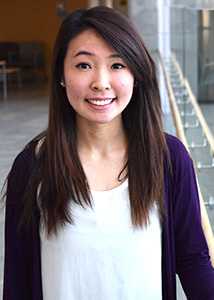It was designed to be a molecular trick, one that could sneak past the stubborn blood brain barrier and attack the cancer straight on.
“Kind of like the Trojan Horse in Greek mythology,” said Lily Takeuchi, a fourth-year student in the UBC Faculty of Medicine’s Bachelor of Medical Laboratory Science (BMLSc) Program. “But we nicknamed our drug capsule the Trojan Bull because it has two horn-like targeting ligands attached to it.”

Lily Takeuchi
Lily is part of a team of UBC students who designed a drug delivery system to treat an aggressive form of brain cancer, known as glioblastoma multiforme. The team presented their project at the 2016 Biomolecular Design (BIOMOD) Jamboree at the University of California San Francisco – and won a gold project award.
“We also placed second in the audience choice award,” she said. “It was an amazing feeling to know that all of our hard work paid off.”
BIOMOD is an international competition for undergraduate students that was founded by the Wyss Institute for Biologically Inspired Engineering at Harvard University. It challenges students to use biological molecules to create solutions to real-world problems.
In the past, teams have created everything from tiny molecular robots to therapeutic prototypes.
The UBC BIOMOD team – which is a multidisciplinary team of students from programs like chemical and biological engineering, biology and microbiology– wanted to create a targeted drug delivery system for brain cancer.
“We want to help people,” said Lily. “Glioblastoma is one of those cancers that is extremely difficult to resect and treat. There really isn’t a good therapeutic option for it right now.”
The team’s Trojan Bull Drug Delivery System uses a liposome, a small membrane sac that can carry drugs and molecules to different parts of the body. After the sac is filled with the drug, ligands with targeting molecules are attached – one is designed to get past the blood brain barrier and the other one targets the cancer cells.
“The idea of drug carriers isn’t new,” said Lily. “But you have to create specific designs based on what you want it to do and that can be very complex.”
Before BIOMOD, Lily wasn’t entirely sure which career path she wanted to follow – but has since narrowed down her interests.
“BIOMOD was a huge eye-opener for me,” she said. “It showed me how science and creativity can be applied in real life and sparked my interest in pursuing graduate studies in therapeutic research and – possibly taking our BIOMOD project into grad school.”
The UBC Faculty of Medicine’s Bachelor of Medical Laboratory Science (BMLSc) Program integrates classroom and hands-on lab experience, preparing students for careers in scientific research and biotechnology. Learn more.